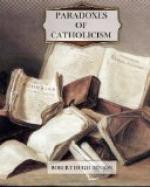Yet look again, you Elder Sons. Have your religious, careful, timid lives ever exhibited anything resembling that depth of self-abjection to which the Younger Son has attained? Certainly you have been virtuous and conscientious; after all, it would be a shame if you had not been so, considering the wealth of grace you have always enjoyed. But have you ever even striven seriously after the one single moral quality which Christ holds up in His own character as the point of imitation: Learn of Me, for I am meek and lowly of heart? It is surely significant that He does not say, expressly, Learn of Me to be pure, or courageous, or fervent; but Learn to be humble, for in this, above all, you shall find rest to your souls. Instead, have you not had a kind of gentle pride in your religion or your virtue or your fastidiousness? In a word, you have not been as excellent an Elder Son as your brother has been a Younger. You have not corresponded with your graces as he has corresponded with his. You have never yet been capable of sufficient lowliness to come home (which is so much harder than to remain there), or of sufficient humility to begin for the first time to work with all your heart only an hour before sunset.
Begin, then, at the beginning, not half-way up the line. Go down to the church door and beat your breast and say not, God reward me who have done so much for Him, but God be merciful to me who have done so little. Get off your seat amongst the Pharisees and go down on your knees and weep behind Christ’s couch, if perhaps He may at last say to you, Friend, come up higher.
THE THIRD WORD
Woman, behold thy son. Behold thy mother.
Our Divine Lord now turns, from the soul who at one bound has sprung into the front rank, to those two souls who have never left it, and supremely to that Mother on whose soul sin has never yet breathed, on whose breast Incarnate God had rested as inviolate and secure as on the Bosom of the Eternal Father, that Mother who was His Heaven on earth. Standing beside her is the one human being who is least unworthy to be there, now that Joseph has passed to his reward and John the Baptist has gone to join the Prophets—the disciple whom Jesus loved, who had lain on the breast of Jesus as Jesus had lain on the breast of Mary.
Our Lord has just shown how He deals with His dear sinners; now He shows how He will be glorified with His Saints. The Paradox of this Word is that Death, the divider of those who are separated from God, is the bond of union between those that are united to Him.
I. Death is the one inexorable enemy of human society as constituted apart from God. A king dies and his kingdom is at once in danger of disruption. A child dies and his mother prays that she may bear another, lest his father and she should drift apart. Death is the supreme sower of discord and disunion, then, in the natural order, since he is the one supreme enemy of natural life. He is the noonday terror of the Rich Fool of the parable and the nightmare of the Poor Fool, since those who place their hope in this life see that death is the end of their hope. For these there is no appeal beyond the grave.




